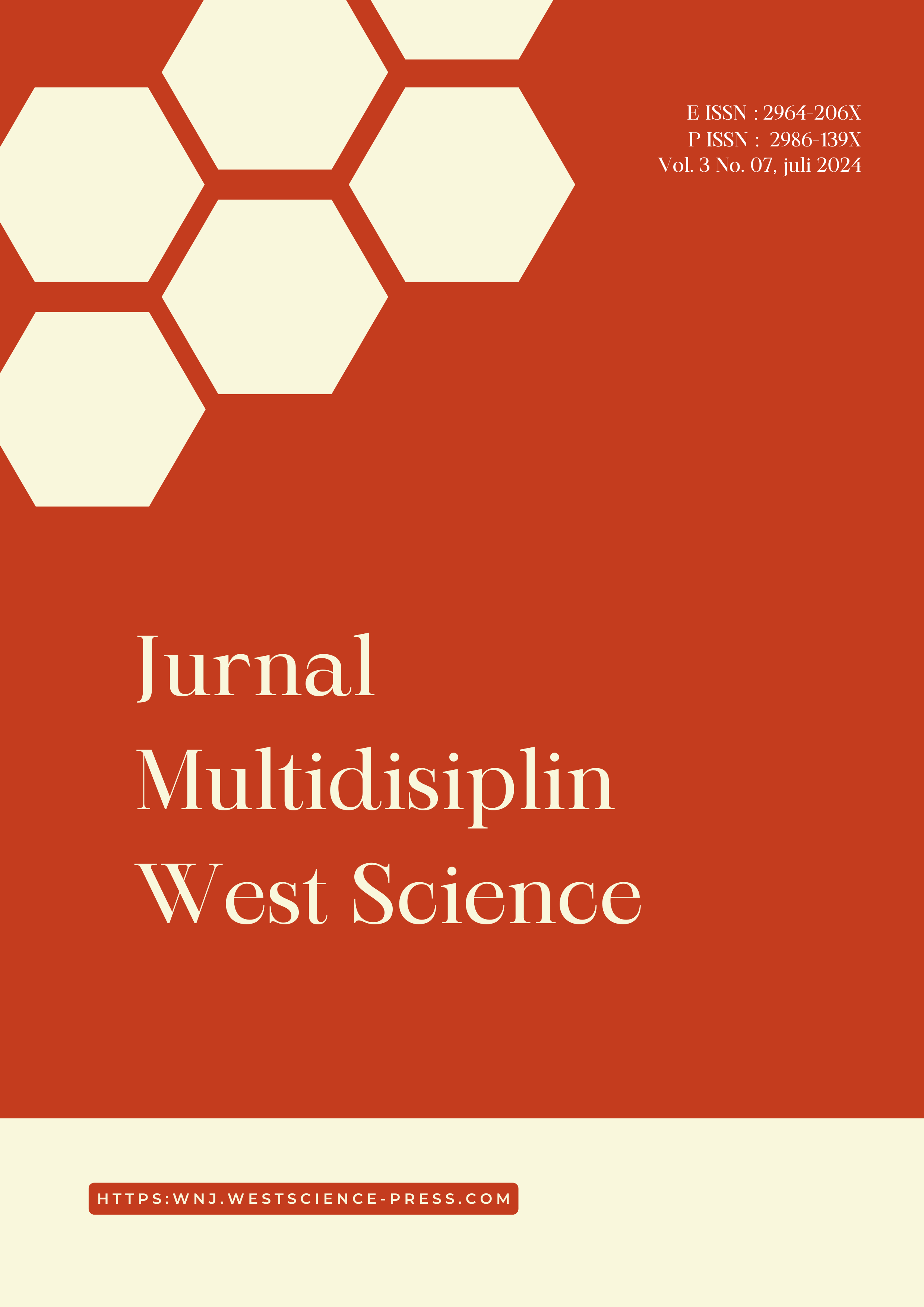Analisis Bibliometrik tentang Efektivitas Media Sosial dalam Meningkatkan Loyalitas Konsumen terhadap Produk Berkelanjutan
DOI:
https://doi.org/10.58812/jmws.v3i07.1486Kata Kunci:
Media Sosial, Kepuasan Pelanggan, Loyalitas Pelanggan, Analisis Bibliometrik, VOSviewerAbstrak
Penelitian ini mengeksplorasi pengaruh media sosial dalam memfasilitasi kepuasan dan loyalitas pelanggan, dengan fokus khusus pada integrasi nilai keberlanjutan dalam strategi pemasaran. Menggunakan analisis bibliometrik dan visualisasi data VOSviewer, studi ini mengidentifikasi klaster utama dalam literatur yang berkaitan dengan pemasaran digital, produk berkelanjutan, dan tanggung jawab sosial perusahaan (CSR). Hasil penelitian menunjukkan tren peningkatan fokus pada keberlanjutan sebagai elemen penting dalam membangun loyalitas pelanggan dalam era digital. Penelitian ini juga menyoroti perubahan paradigma dalam strategi pemasaran akibat pandemi COVID-19, mengungkapkan bagaimana perusahaan menyesuaikan pendekatan mereka untuk tetap relevan dan efektif dalam kondisi pasar yang berubah. Melalui analisis kolaborasi antar peneliti, penelitian ini juga mencatat peluang untuk sinergi akademis lebih lanjut, yang dapat membantu mengintegrasikan berbagai perspektif dalam menghadapi tantangan pemasaran kontemporer.
Referensi
Arndt, J. (1967). Role of product-related conversations in the diffusion of a new product. Journal of Marketing Research, 4(3), 291–295.
Boone, L. E. (2015). Contemporary marketing. Cengage Learning Canada Inc.
Brown, J., Broderick, A. J., & Lee, N. (2007). Word of mouth communication within online communities: Conceptualizing the online social network. Journal of Interactive Marketing, 21(3), 2–20.
Chaudhuri, A., & Holbrook, M. B. (2001). The chain of effects from brand trust and brand affect to brand performance: the role of brand loyalty. Journal of Marketing, 65(2), 81–93.
Chesnokova, A. V, Radina, O. I., & Serdyuk, R. I. (2014). Consumer loyalty as a factor of establishing the competitive advantages in a company under the market conditions. Asian Social Science, 10(23), 255.
Cheung, C., Lee, Z. W. Y., & Chan, T. K. H. (2015). Self-disclosure in social networking sites: the role of perceived cost, perceived benefits and social influence. Internet Research, 25(2), 279–299.
Cone, J., & Winters, K. (2013). Planning and evaluating science video programs using communication science. Journal of Applied Communications, 97(4), 9.
Dwivedi, Y. K., Ismagilova, E., Hughes, D. L., Carlson, J., Filieri, R., Jacobson, J., Jain, V., Karjaluoto, H., Kefi, H., & Krishen, A. S. (2021). Setting the future of digital and social media marketing research: Perspectives and research propositions. International Journal of Information Management, 59, 102168.
Faulds, D. J., & Mangold, W. G. (2014). Developing a social media and marketing course. Marketing Education Review, 24(2), 127–144.
Gentry, L., & Kalliny, M. (2008). Consumer Loyalty - A Synthesis, Conceptual Framework, and Research Propositions. https://api.semanticscholar.org/CorpusID:85454991
Hazra, S., Chatterjee, S., Majumdar, R., & Banerjee, K. (2024). The role of social media in promoting sustainable green cosmetics. International Journal of Research in Management, 6(1), 126–130. https://doi.org/10.33545/26648792.2024.v6.i1b.133
Huang, W. (2023). How Can a Brand Utilize Social Media to Achieve Impressive Promotion. Communications in Humanities Research, 16, 116–120. https://doi.org/10.54254/2753-7064/16/20230564
Kaplan, A. M., & Haenlein, M. (2009). The increasing importance of public marketing: Explanations, applications and limits of marketing within public administration. European Management Journal, 27(3), 197–212.
Kotler, P., Bowen, J. T., Makens, J. C., & Baloglu, S. (2017). Marketing for hospitality and tourism. Pearson.
Lavidge, R. J., & Steiner, G. A. (1961). A model for predictive measurements of advertising effectiveness. Journal of Marketing, 25(6), 59–62.
Leung, D., Law, R., Van Hoof, H., & Buhalis, D. (2013). Social media in tourism and hospitality: A literature review. Journal of Travel & Tourism Marketing, 30(1–2), 3–22.
Mahadeva, R., Ganji, E. N., & Shah, S. (2024). Sustainable Consumer Behaviours through Comparisons of Developed and Developing Nations. International Journal of Environmental Engineering and Development, 2, 106–125.
Oliver, R. L. (1999). Whence consumer loyalty? Journal of Marketing, 63(4_suppl1), 33–44.
Polonsky, M. J. (2008). An introduction to green marketing. Global Environment: Problems and Policies, 2(1), 1–10.
Rathee, S., & Milfeld, T. (2023). Sustainability advertising: literature review and framework for future research. International Journal of Advertising, 43, 1–29. https://doi.org/10.1080/02650487.2023.2175300
Sarmah, P., & Singh, A. P. (2024). The Effectiveness of Sustainable Marketing Practices in Influencing Consumer Behaviour and Brand Loyalty. International Journal For Multidisciplinary Research. https://api.semanticscholar.org/CorpusID:268355523
Sashi, C. M. (2012). Customer engagement, buyer‐seller relationships, and social media. Management Decision, 50(2), 253–272.
Singh, N. (2024). Consumers’ Choice Behavior Towards Sustainable Fashion Based on Social Media Influence. In Driving Green Marketing in Fashion and Retail (pp. 1–25). IGI Global.
SK, M. B., & Nagaraju, Y. (n.d.). Role of Sustainability in Digital Age: Leveraging Social Media for Green Marketing Campaigns an Empirical Study with Reference to Bangalore.
Tuten, T. L. (2023). Social media marketing. Sage publications limited.
Widiastuti, E., Sukesi, S., & Sarsiti, S. (2024). Sustainable Marketing in the Digital Age: A Systematic Review of the Latest Strategies and Tactics. International Journal of Economics, Business and Accounting Research (IJEBAR), 8(1).
Zhao, X. (2023). The Impact of Social Media on Communication and Marketing Strategies in the Digital Age. Communications in Humanities Research, 10, 49–54. https://doi.org/10.54254/2753-7064/10/20231240
Zheng, Y. (2024). The Impact of Brand Loyalty on Consumer Purchase Decisions and Analysis of Sustainable Consumption Strategies. Frontiers in Business, Economics and Management. https://api.semanticscholar.org/CorpusID:270600315
Unduhan
Diterbitkan
Cara Mengutip
Terbitan
Bagian
Lisensi
Hak Cipta (c) 2024 Subfian Malisa, Hommy Dorthy Ellyany Sinaga, Agung Zulfikri

Artikel ini berlisensiCreative Commons Attribution-ShareAlike 4.0 International License.



















 Instagram
Instagram 